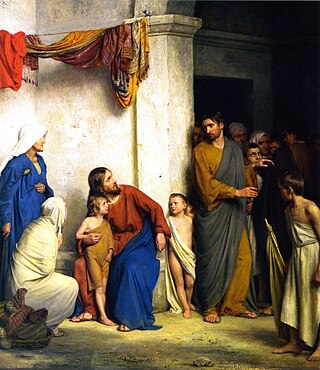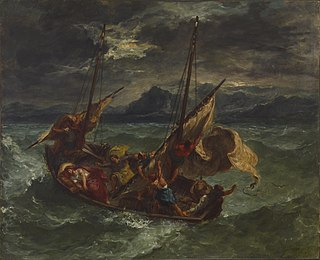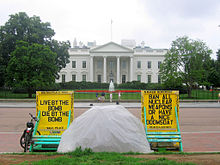
Aeschylus was an ancient Greek tragedian often described as the father of tragedy. Academic knowledge of the genre begins with his work, and understanding of earlier Greek tragedy is largely based on inferences made from reading his surviving plays. According to Aristotle, he expanded the number of characters in the theatre and allowed conflict among them. Formerly, characters interacted only with the chorus.

Matthew the Apostle is named in the New Testament as one of the twelve apostles of Jesus. According to Christian traditions, he was also one of the four Evangelists as author of the Gospel of Matthew, and thus is also known as Matthew the Evangelist.

Turning the other cheek is a phrase in Christian doctrine from the Sermon on the Mount that refers to responding to insult without retort. This passage is variously interpreted as accepting one's predicament, commanding nonresistance or advocating Christian pacifism.

The Sermon on the Mount is a collection of sayings spoken by Jesus of Nazareth found in the Gospel of Matthew that emphasizes his moral teachings. It is the first of five discourses in the Gospel and has been one of the most widely quoted sections of the Gospels.

The Oresteia is a trilogy of Greek tragedies written by Aeschylus in the 5th century BCE, concerning the murder of Agamemnon by Clytemnestra, the murder of Clytemnestra by Orestes, the trial of Orestes, the end of the curse on the House of Atreus and the pacification of the Furies.
Nonresistance is "the practice or principle of not resisting authority, even when it is unjustly exercised". At its core is discouragement of, even opposition to, physical resistance to an enemy. It is considered as a form of principled nonviolence or pacifism which rejects all physical violence, whether exercised on individual, group, state or international levels. Practitioners of nonresistance may refuse to retaliate against an opponent or offer any form of self-defense. Nonresistance is often associated with particular religious groups, such as Anabaptist Christianity.

Matthew 3:2 is the second verse of the third chapter of the Gospel of Matthew in the New Testament. John the Baptist has been introduced in the first verse and this verse describes the message that he is preaching. Through John's message, Matthew introduces the "Kingdom of Heaven".

Matthew 5:1 and Matthew 5:2 are the first two verses of the fifth chapter of the Gospel of Matthew in the New Testament. The verses introduce the Sermon on the Mount that will be recited in the next several chapters. The previous chapter concluded with large crowds "from Galilee, and from the Decapolis, Jerusalem, Judea, and beyond the Jordan" who followed Jesus to witness him healing: these verses present Jesus as seeing the crowds and going up onto a mountain to begin teaching.

Matthew 5:39 is the thirty-ninth verse of the fifth chapter of the Gospel of Matthew in the New Testament and is part of the Sermon on the Mount. This is the second verse of the antithesis on the command: "eye for an eye". In one of the most famous verses in the New Testament, Jesus here rejects revenge and retaliation, instead telling his followers to turn the other cheek.

Matthew 7:15 is the fifteenth verse of the seventh chapter of the Gospel of Matthew in the New Testament and is part of the Sermon on the Mount. This verse begins the section warning against false prophets.

Matthew 10 is the tenth chapter in the Gospel of Matthew in the New Testament section of the Christian Bible. This chapter opens with Jesus calling some of his disciples and sending them out to preach and heal. This section is also known as the Mission Discourse or the Little Commission, in contrast to the Great Commission at the end of the gospel. The Little Commission is directed specifically to the "lost sheep of the house of Israel", while the Great Commission is directed to all nations. The Pulpit Commentary suggests that Jesus' message in this discourse "was hardly likely to have been remembered outside Jewish Christian circles".

The parable of drawing in the net, also known as the parable of the dragnet, is a Christian parable that appears in the Gospel of Matthew, chapter 13, verses 47–52. The parable refers to the Last Judgment. This parable is the seventh and last in Matthew 13, which began with the parable of the Sower. It directly follows the Parable of the Pearl, which is about the Kingdom of God. Thus, it links the Kingdom of God with the final judgment—the separation for hell and heaven.

Jesus' teachings referring to little children and infants/babies appear in a few places in the New Testament and in the non-canonical Gospel of Thomas.
Matthew 9:24 is a verse in the ninth chapter of the Gospel of Matthew in the New Testament.

Matthew 8:26 is a verse in the eighth chapter of the Gospel of Matthew in the New Testament.

Matthew 14:27 is a verse in the fourteenth chapter of the Gospel of Matthew in the New Testament.

Christian pacifism is the theological and ethical position according to which pacifism and non-violence have both a scriptural and rational basis for Christians, and affirms that any form of violence is incompatible with the Christian faith. Christian pacifists state that Jesus himself was a pacifist who taught and practiced pacifism and that his followers must do likewise. Notable Christian pacifists include Martin Luther King Jr., Leo Tolstoy, Adin Ballou, Dorothy Day, Ammon Hennacy, and brothers Daniel and Philip Berrigan.

The exorcism of a boy possessed by a demon, or a boy with a mute spirit, is one of the miracles attributed to Jesus reported in the synoptic Gospels, involving the healing of a demonically possessed boy through exorcism. It is in all Synoptic Gospels: Mark 9:17-29, Matthew 17:14-21, Luke 9:40-44. In the Gospel narratives, this healing takes place following the Transfiguration.
Sell your cloak and buy a sword is an instruction by Jesus to his disciples during the Last Supper which has been interpreted in several ways.

The phrase "violence begets violence" means that violent behaviour promotes other violent behaviour, in return. The phrase has been used since the early 19th century.

















